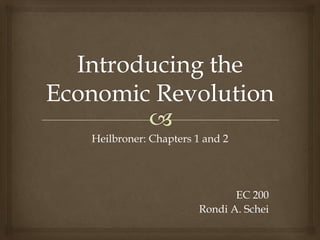
Introducing the Economic Revolution
- 1. Heilbroner: Chapters 1 and 2 EC 200 Rondi A. Schei
- 2. Outline What are world changing ideas? Why is a knowing person’s background important? How were early societies organized? How does the market system organize society? What are the different economic systems?
- 3. World Changing Ideas Heilbroner finds it strange that people do not know much about these men; in fact, most do not even know who they are. Class Activity Name other men who have changed the world. No repeats. How is it possible that these men could change the world and no one remember who they are? What do you think constitute “world changing ideas?” Can you predict some of the world changing ideas that will be mentioned in Heilbroner’s book?
- 4. Importance of Background Heilbroner mentions a group of nine mend from different walks of life and calls them: a philosopher, a madman, a cleric, a stockbroker, a revolutionary, a nobleman, an aesthete, a skeptic, and a tramp. Small Group Activity: (15 min) What theme could emerge from this statement? What is Heilbroner trying to say by pointing out the men’s disparate backgrounds? Considering the importance of their ideas, why are their individual stories important?
- 5. Early Survival How societies organized by tradition and the role of cooperation. Small Group Activity: (20 min) Your group is an individual society. Discuss how you would organize your traditional society. Create a diagram on the board demonstrating to the class how you propose to survive by using tradition. Class Discussion: What problems are posed by the fact that man must work in groups and cooperate with others in order to achieve certain accomplishments? How does the fact that man is self-centered make this difficult? What was the major impetus in early societies that helped man overcome this difficulty?
- 6. Emergence of the Market System Economics came into existence as a result of the third way of dealing with the survival problem and that was by letting everyone do what they wanted within a prevailing framework. Small Group Activity: (20 min) Create a timeline for the emergence of the market system. Include brief descriptions. Any artwork is ok. Draw your timeline on the board and compare with other groups. Class Activity: Discuss how this system functioned by everyone doing what was in their own best financial interests? Does the system provide guarantees that all of the tasks would be performed or that there would be people to perform the tasks?
- 7. Different Economic Systems Feudalism is an economic system based on tradition and dominated the Western world from the 8th to the 15th century Mercantilism an economic system in which the government controls economic activity by doling out the rights to undertake economic activities and was dominant until the 18th century Capitalism an economic system based on the market in which the ownership of the means of production resides with a small group of individuals (called capitalists) Welfare Capitalism above + governments that regulated capitalistic abuses and provided economic safety nets. Socialism an economic system based on individuals’ goodwill towards others, not on their own self-interest, and in which, in principle, society decides what, how, and for whom to produce
- 8. Conclusion Concepts, ideas, social norms that we take for granted today are due to great thinkers of the past. Societies require an organizational framework so that they can thrive. Capitalism evolved due to its flexibility when faced with societal changes.
- 9. Upcoming Post a response to the discussion forum by this Friday at 4pm. Discussion replies must be made before class on Monday (4pm). Reading Quiz due Monday at 4pm over Heilbroner Chapters 3 and 4.
Editor's Notes
- Impetus: a stimulation or encouragement resulting in increased activityHis discoveries have given impetus to further research.